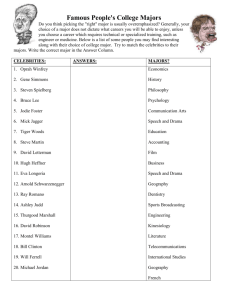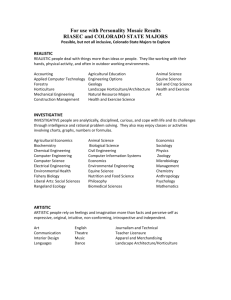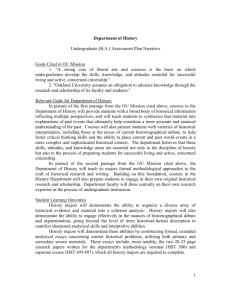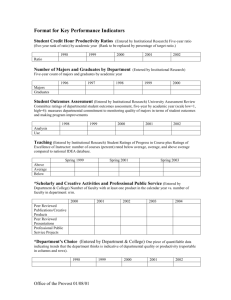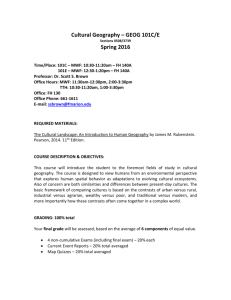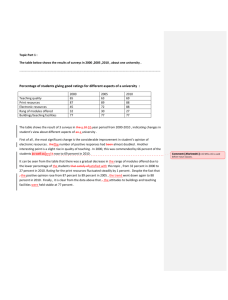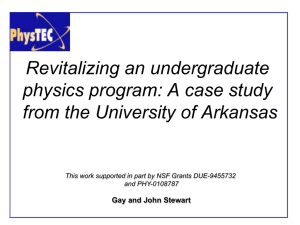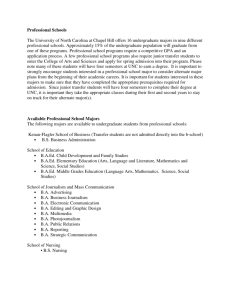2004-2005 - ACS Integration: Home
advertisement
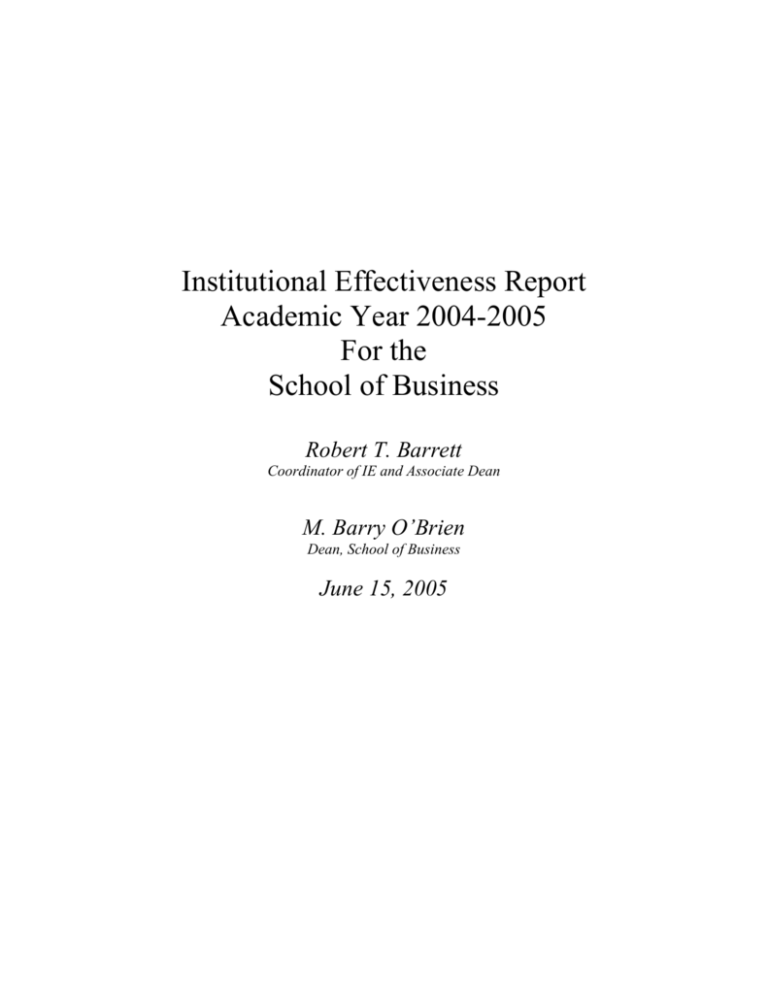
Institutional Effectiveness Report Academic Year 2004-2005 For the School of Business Robert T. Barrett Coordinator of IE and Associate Dean M. Barry O’Brien Dean, School of Business June 15, 2005 533576009 1 Program Mission and Goals FMU School of Business Strategic Plan [2002 – 2007] Vision Statement The School of Business at Francis Marion University strives to provide the highest quality baccalaureate and master's degree business programs offered at a small, comprehensive university in the southeastern United States. Mission Statement Accredited at both the graduate and undergraduate levels, the School of Business at Francis Marion University has a mission of teaching, research, and service. Nearly our entire faculty holds a doctorate in the area in which they teach. Our small classroom environment promotes interaction among students and faculty. We teach students to think logically, communicate effectively, develop an understanding and appreciation of the global business environment, and be guided by high ethical standards. Our students develop conceptual and analytical skills needed to be successful leaders in both private and public institutions. Our internship program and placement efforts actively assist students in finding meaningful jobs. Our faculty conducts research and service activities that enhance the region’s economic and industrial development. Most of our undergraduate students major in Management, Marketing, Accounting, Finance, Business Economics, Management Information Systems, or General Business and earn a Bachelor of Business Administration degree. Other School of Business students major in Economics or Computer Science and receive a Bachelor of Arts or Bachelor of Science degree. Our graduate students receive a Master of Business Administration degree and may become certified in Health Management. The School of Business seeks students locally and globally of all ages and ethnic backgrounds and serves them in a friendly, considerate manner. Objectives 1. Obtain and maintain a critical mass of terminally qualified faculty members in each of the six business disciplines in which we offer majors. 2. Establish an endowment fund for the School of Business. 3. Increase enrollment, majors, credit hours, and graduates from the School of Business: 4. Increase the opportunity for Business students to have work experience during their college career and improve placement activities provided for Business students. 5. Increase the opportunity for Business students to have international educational experience during their college career. 6. Maintain an up-to-date curriculum that prepares students for careers in Business. 533576009 2 Assessment Activities This section is to include the descriptions, timelines, names, procedures, etc. you use to evaluate the program. 1. Obtain and maintain a critical mass of terminally qualified faculty members in each of the six business disciplines in which we offer majors. To assess this goal, we will monitor the recruiting process within each discipline and list the 5year publication records of current faculty members. AACSB indicates that a current record of scholarly activity supports the academic credentials of faculty. Accounting – as indicated in Table 1, there were 103 accounting majors declared in 2005, up from 98 in 2004. In addition to advising these accounting majors and teaching upper-level accounting courses, the faculty in accounting teach the ACTG 201 (Financial Accounting) and ACTG 202 (Managerial Accounting) courses that are required for all business majors. Students who minor in business also take ACTG 201. We would like the accounting faculty to consist of 4 terminally qualified faculty members plus part time adjunct faculty as needed. Economics – as indicated in Table 1, there were 27 business economics and economics majors declared in 2005, up from 25 in 2004. In addition to advising these economics majors and teaching upper-level economics courses, the faculty in economics teach the ECON 203 (Microeconomics) and ECON 204 (Macroeconomics) courses that are required for all business majors. Students who minor in business also take ECON 203. We would like the economics faculty to consist of 5 terminally qualified faculty members. Finance – as indicated in Table 1, there were 52 finance majors declared in 2005, up from 45 in 2004. In addition to advising these finance majors and teaching upper-level finance courses, the faculty in finance teach the FIN 341 (Financial Management) course that is required for all business majors. We would like the finance faculty to consist of 2 terminally qualified faculty members plus help from other areas (e.g., economics and accounting). Management and General Business – as indicated in Table 1, there were 332 management and general business majors declared in 2005. In addition to advising these management and general business majors and teaching upper-level management and general business courses, the faculty in management and general business teach the BUS 205 (Business Statistics), BUS 206 (Legal and Social Environment of Business), MGT 308 (Management Science and Operations Management), MGT 351 (Principles of Management), and BUS 458 (Strategic Management – the capstone business experience) courses that are required for all business majors. We would like the management and general business faculty to consist of 7 terminally qualified faculty members, plus adjuncts to cover lower level courses as needed. Management Information Systems – as indicated in Table 1, there were 93 Management Information Systems majors declared in 2005. In addition to advising these Management Information Systems majors and teaching upper-level Management Information Systems courses, the faculty in Management Information Systems teach the MIS 327 (Information 533576009 3 Systems Fundamentals) course that is required for all business majors. We would like the Management Information Systems faculty to consist of 3 terminally qualified faculty members. Marketing – as indicated in Table 1, there were 105 Marketing majors declared in 2005. In addition to advising these marketing majors and teaching upper-level marketing courses, the faculty in marketing teach the MKT 331 (Principles of Marketing) course that is required for all business majors. We would like the marketing faculty to consist of 3 terminally qualified faculty members. Computer Science – as indicated in Table 1, there were 92 Computer Science majors declared in 2005. In addition to advising these Computer Science majors and teaching upper-level Computer Science courses, the faculty in Computer Science teach the CS 150 (Microcomputers and Software Applications I) course that is required for all students at the university. We would like the Computer Science faculty to consist of 7 qualified faculty members. 2. Establish an endowment fund for the School of Business. Francis Marion University has recently completed a capital campaign, raising over $18 million for the university. The School of Business, particularly the dean, is helping to develop relationships with local businesses and local industries. The School of Business faculty, with the mission to forward economic development in the area, does volunteer work and consults with businesses and civic organizations. In addition to providing this valuable service to the community, this work should lead to fund-raising opportunities. An increase in external funding is critical to the success in carrying out the strategic plan of the School of Business. 3. Increase enrollment, majors, credit hours, and graduates from the School of Business. Enrollments (majors), credit hours, and graduates are monitored on an annual basis. In the early 1990s, the university had enrollments approaching 4000 students and the School of Business had enrollments approaching 1000. The School of Business would like to move back towards that 1000 student figure. In fall 2001, the School embarked on a project to ensure that every entering freshman and transfer student in business would enroll in BUS 150, Fundamentals of Business. This course is designed to introduce the students to the varying possibilities for careers in business, get the students excited about majoring in business, and help the students develop a plan for graduation. This initiative has resulted in about 400 students enrolling in this course annually. We believe that BUS 150 is very important to increasing the number of students declaring business as a major, increasing enrollments in business classes, and hopefully increasing numbers of graduates from the School of Business. The School continues to develop the internship program. The contacts established through this program help students during their formal education at FMU as well as provides potential for future employment. The Marketing and Management disciplines have well established programs. Finance and MIS are working to develop internship programs. With added opportunities for students, more individuals will be attracted to the business major. 533576009 4 4. Increase the opportunity for Business students to have work experience during their college career and improve placement activities provided for Business students. The School of Business has a successful Internship Program in Marketing and Management. Faculty advisers contact local businesses to set up relationships. Students are matched with businesses so that the goals of both are met. In 2000-2005, the School placed interns with McLeod Regional Medical Center, Carolinas Hospital Systems, Young Pecan Company, Roche Carolina Pharmaceuticals, Webster Rogers Accounting, Pathological Services Associates, ArvinMeritor, S & W Manufacturing, and the Pee Dee Pride Hockey Team. 5. Increase the opportunity for Business students to have international educational experience during their college career. The School of Business continues to lead the university in participation in the International Exchange program. Since the formal program began, some fifty business students have taken advantage of international travel and study. Business students have studied in Germany, Mexico, and Australia. In addition to our students traveling abroad, the program has helped the university attract students from exchange agreement universities, many of whom study business. This program greatly expands the global culture at the university and within the School of Business. One additional benefit is that Dr. Gabi Theuner, Marketing Professor, visited the university on a faculty exchange from Germany and then decided to apply for a position with the School of Business. She is now tenured and brings a wealth of international and research expertise to our faculty. 6. Maintain an up-to-date curriculum that prepares students for careers in Business. Since a major program evaluation resulted over 50 changes in curriculum in the 2002-2003 academic year, there was less emphasis placed on program evaluation in 2004-2005. With the assurance of learning plan being put into action in 2005-2006, we anticipate a more thorough evaluation of how the curriculum meets specific goals. 533576009 5 Results and Evaluation This section is for presentation of result/analysis of your evaluations. 1. Obtain and maintain a critical mass of terminally qualified faculty members in each of the six business disciplines in which we offer majors. Table 5, shown at the end of this document, reports the publications of the faculty for the five-year period 2000 through 2005. AACSB regards a five-year period as current. Included in the text is a statement of the scholarly output for each discipline, based on Table 5. This extensive list of publications shows the dedication of the School of Business faculty to remaining current. Accounting – in 2004, the School carried out an intensive recruiting effort to add one Ph.D. to the accounting faculty. Dr. Charles Carpenter accepted an offer and will join the faculty in August 2005. Along with Dr. Carolyn Stokes and Dr. Brad Johnson, we now have three terminally qualified accounting faculty members. As Dr. Stokes retires in 2006, we will seek to fill her position. Mrs. Betty David, who has a masters degree as well as the CPA, teaches in the accounting area, mainly covering basic financial accounting. In fall 2005, two adjunct faculty members will help to cover the accounting courses, Mr. Howard Lundy, the university auditor, and Mr. Tim Lowder. It is hoped that an additional Ph.D. can be added in accounting in the near future. Although the classes are covered by good teachers, we would like to have terminally qualified faculty members to help build the accounting program. The Accounting faculty published 2 peer reviewed journal article during the 2000 – 2005 period. Economics – Mr. Damian Von Frank, who is ABD in Economics from Florida State University, will continue as a visiting professor for the 2005-2006 academic year. Mr. Von Frank also has extensive graduate work in Finance and might assist in that area. Mr. Von Frank joins Dr. Jeff Pompe, Dr. Ben Kyer, Dr. David Franck, and Dean Barry O’Brien to form a strong, wellpublished area in Economics. The Economics faculty published 18 peer reviewed journal articles during the 2000 – 2005 period. In addition, one book and two significant contributions to other books were published. Finance – Dr. Michael Hughes and Dr. Neil Riley, with assistance from Mr. Von Frank, make up a strong teaching faculty with the potential to perform outstanding research. The Finance faculty published 4 peer reviewed journal articles during the 2000 – 2005 period. Management and General Business – In fall 2005, the management and general business faculty will consist of Dr. Joe Aniello, Dr. Robert T. Barrett (Associate Dean), Dr. Scott Campbell, Dr. Fred R. David, Dr. James E. Holsenback, and Dr. Robert E. Pugh. This group covers the broad spectrum of areas included in management and general business and is well published in the area. 533576009 6 The Management faculty published 8 peer reviewed journal articles during the 2000 – 2005 period. In addition, this group published 9 case studies and 2 editions of a book with the accompanying ancillary materials. Management Information Systems – Dr. Yong Shin was added to the MIS faculty in 2005. In fall 2005, the MIS faculty will include Dr. Shin, Dr. Allen Smith, and Dr. Buddy Bilbrey. Dr. Bilbrey also teaches in the computer science area. This group is working to upgrade the curriculum in this ever-changing, dynamic field. To better serve our students and region, the MIS faculty is investigating the possibility of changing to an Information technology focus. The MIS faculty published 2 peer reviewed journal article during the 2000 – 2005 period. Marketing – in fall 2005, the Marketing faculty will include Dr. Kay Lawrimore, Dr. Gabi Theuner, and Ms. Mary Dittman. Marketing is one of our most popular majors, probably because of the knowledgeable and caring faculty in the area. Headed by Ms. Dittman, the Marketing Club is one of the most active clubs on campus. Also, Ms. Dittman has worked to build the marketing internship program. The marketing faculty is very active in community service and consulting. The Marketing faculty published 9 peer reviewed journal articles and 2 case studies during the 2000 – 2005 period. Computer Science – An attempt to fill the coordinator position was unsuccessful. We will continue this search in 2005. In fall 2005, the Computer Science faculty will include Dr. Edward Arroyo, Dr. Buddy Bilbrey, Mr. Gary Coker (completing the Ph.D. degree), Dr. Margie Covington, Mr. Kevan Croteau, and Mrs. Padmaja Rao. This group makes up a strong CS faculty, one of the best teaching cohorts on campus. The Computer Science faculty published 3 peer reviewed journal articles during the 2000 – 2005 period. 2. Establish an endowment fund for the School of Business. Prior to this year, only small amounts of money have been raised to support the efforts of the School of Business. The School was awarded $90,000 in 2003 from the state’s TGP grant. This money was used to upgrade faculty computers, upgrade the School of Business Computer Lab computers, and to develop a multimedia classroom. For the 2005-2006 fiscal year, the Donald E. Kelley Small Business Institute, that serves small and minority businesses in the region, will be funded at $400 thousand. This amount is a recurring line item in the state’s annual budget. The School of Business will also manage a $100 thousand budget for the Non Profit Institute. Dr. Carolyn Stokes has developed a series of review seminars designed to prepare individuals for certification exams in management accounting and financial management. Faculty who participate in the delivery of this program have money placed in a special account earmarked to 533576009 support professional travel. Faculty members have used these funds to travel to professional meetings to present results of scholarly research. 3. Increase enrollment, majors, credit hours, and graduates from the School of Business. Table 1 shows the number of majors in the School of Business. Table 2 gives credit hours by major. Table 3 shows the graduates by major. As Table 1 shows, the School of Business has experienced steady growth over the past 5 years. We are pleased with this growth and would like to see it continue. With the current number of faculty members, it will be difficult to handle the anticipated growth. As enrollments in the School of Business approach 1000 majors, 900 at the undergraduate level and 100 MBAs, the addition of at least two faculty members will be required. Table 1. Number of students majoring in School of Business disciplines – 2001 – 2005. Students Majoring in School of Business Disciplines Major Accounting Business Economics Computer Science Economics Finance General Business Management Management Inf. Sys. Marketing Total Undergraduate MBA 2001 75 15 122 6 34 172 53 126 58 661 2002 90 16 125 10 27 190 72 138 71 739 2003 85 19 128 8 36 221 94 120 86 797 2004 98 13 115 12 45 235 109 102 113 842 2005 103 11 92 16 52 226 106 93 105 804 53 57 56 47 52 Table 2. Number of credit hours taught by School of Business faculty – 2000 – 2005. Credit Hours by Discipline Discipline Computer Science Lower Undergraduate Upper Undergraduate Total Undergraduate Graduate Total Business and Management Lower Undergraduate Upper Undergraduate Total Undergraduate Graduate Total 00-01 2031 397 2428 0 2,428 2724 4419 7143 486 7,629 Academic Year 01-02 02-03 03-04 2592 2589 2439 921 1487 580 3513 4076 3019 0 36 0 3,513 4,112 3,019 2982 4362 7344 552 7,896 3384 4194 7578 459 8,037 3420 6102 9522 549 10,071 04-05 2820 443 3263 0 3,263 3684 6096 9780 600 10,380 7 533576009 8 Table 3. Number of graduates by major – 2000 – 2005. Major Number of Graduates by Major 00-01 01-02 02-03 03-04 04-05 17 3 3 5 14 9 23 27 16 117 10 3 10 2 7 18 16 28 19 113 14 1 14 1 14 16 23 25 28 136 20 2 7 2 14 20 30 33 33 161 11 17 19 20 11 105 134 132 156 172 Undergraduate: Accounting Business Economics Computer Science Economics Finance General Business Administration Management Management Information Systems Marketing Total Undergraduate 8 5 8 5 10 7 14 22 15 94 Graduate: MBA Total 4. Increase the opportunity for Business students to have work experience during their college career and improve placement activities provided for Business students. In fall of 2004, Dr. David Franck organized a new offering for business students entitled “Connections to Success.” Dr. Franck’s report to the Provost is given below. The inaugural “Connections to Success” event bringing together Francis Marion University students with our local business community was held over two days, Tuesday September 21st and Wednesday September 22nd, 2004. The purpose of the event was to provide an opportunity for students to learn from the experiences of our alumni and business community, gain insight into potential career paths, and promote greater involvement of our stakeholders in developing our students for the marketplace. The “Connections to Success” event was sponsored by the FMU School of Business faculty in cooperation with The Economics Society and Delta Sigma Pi. Eight panel style sessions were held during the 2-day event with 21 presenters and over 400 attendees. All of the topics discussed were intended to be of special interest to students as they make the connection to successful careers. Subjects presented of particular interest and importance concerned: making the transition from school to work; opportunities for women and minorities; entrepreneurship; business ethics; communications; interviewing and graduate schools. Thanks to the efforts of the participants, attendees, the individual faculty sponsors and the involvement of our student organizations, the inaugural Connections to Success event was a tremendous success. 533576009 9 Tracking procedures are poor with regards to determining where our graduates get jobs. We certainly need to improve in this area. We also need to work closely with the Career Planning and Placement Office to help the University develop the placement process. The School of Business faculty continues to work diligently to place graduates in meaningful jobs. We are getting better with the internship program, placing students with local firms to gain valuable experience. In 2004-2005, Mary Dittman worked with over 50 marketing majors and local companies with the Marketing Internship program. Marketing experiences were gained in the communications field, sports management, social services, and other areas. Dr. Joe Aniello worked with several management majors in the Management Internship program. Students gained experience with small business in the area as well as in research positions. Business students joined forces with art students to develop a business opportunity designed to support the Arts Guild, an FMU student organization. This effort resulted in the development of note cards containing photographs taken by FMU students that were sold by the business and art students to support this cause. 5. Increase the opportunity for Business students to have international educational experience during their college career. In 2003-2004, three business majors studied abroad for one semester. Erin Holladay, Sissy Altman, and Jessica Carmichael studied at the University of the Sunshine Coast in Australia. The number of international students taking courses in business and who return to pursue the MBA degree as well as undergraduate degrees continues to grow. 6. Maintain an up-to-date curriculum that prepares students for careers in Business. There were no changes to the overall curriculum in the School of Business during 2004-2005. During December 2004 and April 2005, the Dean of the School of Business gave exit interviews to seniors in the capstone Strategic Management course, BUS 458. Also, the School of Business administers the ETS Major Field exam in the BUS 458 class. The results of the ETS exams are presented in Table 4. Results of the Dean’s Exit Interview for spring 2005 and fall 2004 are presented in Tables 6 and 7, respectively. From Table 4 we note that it appears that the FMU business students showed no significant change, on average, on the eight assessment indicators. The only areas where students improved were in economics and international issues. FMU’s averages were slightly below (but not significantly below) the national average in all areas, being within one or two standard deviations of the national average. 533576009 10 Table 4. Results on the 2002, 2003, and 2004 ETS Major Field Exams. 2003 2003 2004 2004 2005 Accounting Economics Management Quantitative Business Analysis Finance Marketing Legal and Social Environment International Issues National FMU 44.2 44.6 41.3 43.2 53.8 57.6 2005 FMU 44.6 41.1 59.1 National 44.1 42.2 57.5 FMU 43.9 39.9 57.1 National 55 55.2 54.9 56.7 54.7 56.6 36 49.4 36.1 46.4 34.9 49.9 36.6 47.3 33.2 36.4 45.4 46.8 49.7 48.9 48.6 49.8 45.9 49.8 42.7 44 42 44.6 43.1 44.3 44.6 42.8 57.1 Results of the Spring School of Business Exit Interview are shown at the end of this report. Please refer to Table 6 to see the text for the question numbers referenced here. Seventy-six seniors completed the Dean’s Exit Interview in spring 2005. Results of the fall 2004 School of Business Exit Interview are shown in Table 7, where 57 seniors completed the interview. Questions 1 and 25 address the students’ overall impression of the School of Business and FMU. Responses to these questions in both spring 2005 and fall 2004 were very positive, all ratings in the 91% to 96% range. Our approval ratings improved over the previous academic year where ratings ranged from 78% to 92%. Students feel good about the education received at FMU. Other questions dealing generally with the students’ impression of the FMU School of Business also receiving positive responses were questions 2, 7, 12, 22, and 24. Ratings for these five questions ranged from 78% to 93% for positive responses. Questions 4, 8, 11, and 24 relate to the students’ job prospects upon completion of the degree. According to these responses, fall graduates felt less prepared to enter the working world than spring graduates (question 11). Students generally feel that they will be well prepared for the business world, although question 4 for both fall and spring showed rather neutral responses concerning ability to compete. Questions relating to the performance of the faculty include questions 6, 15, 16, 19, and 20. Students felt strongly that faculty are knowledgeable and dedicated (question 19 with over 92% approval) and that faculty are generally well prepared for class (question 6 with over 82% approval). Students rate the faculty relatively low on their concern for students (question 16 with 67% to 75% approval) and on availability outside of class (question 20 with just over 72% approval). Overall the students appear to be pleased with the School of Business faculty, but we need to continue to work on being more available and showing more concern for our students. These results will be shared with the faculty at the summer planning retreat. 533576009 11 Each spring, faculty members submit their Faculty Annual Report detailing the year’s work in teaching, scholarly activities, and service. Following a review of their work, each faculty member receives his/her Faculty Annual Review and Evaluation. 533576009 12 Improvements in Place This section is for discussion of improvements you have made as a result of last year’s evaluation. 1. Obtain and maintain a critical mass of terminally qualified faculty members in each of the six business disciplines in which we offer majors. The School of Business hired Dr. Charles Carpenter in Accounting and Dr. Yong Shin in MIS. These hires greatly strengthen the teaching, leadership, and scholarly output of our faculty. 2. Establish an endowment fund for the School of Business. The Dean of the School of Business continues to work closely with the Director of the FMU Foundation in fund raising efforts. 3. Increase enrollment, majors, credit hours, and graduates from the School of Business. Enrollment numbers have steadily increased over the last five years. Encouraging all students who have interest in business to enroll in BUS 150 appears to have helped in increasing the number of business majors. Continuing to develop the advising system, improving the internship program, and helping to improve our placement services should add to the desire of students to major in business and pursue business careers. Also, to increase opportunities for business students to gain exposure to the business world, the business faculty support clubs and organizations for students. The Marketing Club is very active, inviting speakers and holding workshops on such timely topics as resume writing and etiquette. The Society for the Advancement of Management sponsored a student group in a national case competition in 2002 and developed a resume booklet for distribution to potential employers in 2003. Beta Gamma Sigma, the AACSB honorary society, regularly initiates our top students into this organization. This group successfully completed a canned food drive in fall 2004 for a local food bank. 4. Increase the opportunity for Business students to have work experience during their college career and improve placement activities provided for Business students. We have developed an internship program. We need to further develop this program from the business side as well as the student side. We see great opportunities here for our students. The marketing and management areas have taken the lead in the internship program. We hope to build on their successes by developing finance and MIS internship programs. The accounting and economics areas should follow suit in future years. 533576009 13 5. Increase the opportunity for Business students to have international educational experience during their college career. We continue to encourage students to participate in international travel/study opportunities. We would like to have four or more business students involved every year in these exchange programs. Dr. Theuner hosts an international dinner for business students at a local Chinese restaurant. A local business person with extensive international experience speaks to this group. 6. Maintain an up-to-date curriculum that prepares students for careers in Business. The focus of the summer retreat will be the establishment of a process to assess learning goals. We will host a consultant expert in the area who will guide us through the process of developing goals and means of measuring these goals as dictated by the new AACSB standards. This program will not only help us to satisfy AACSB requirements but will establish a structure for continuously evaluating and improving our curriculum. 533576009 14 Planned Improvements This section is for your plan and/or specific actions you intend to implement during the coming academic year. I recommend caution in making these recommendations since you might not be able to even attempt to carry out your plan. 1. Obtain and maintain a critical mass of terminally qualified faculty members in each of the six business disciplines in which we offer majors. In fall 2005 we will seek to replace faculty in accounting and management and will add one management position to help cover courses in non-profit management (program under development). It is hoped that a fourth Ph.D. can be added in accounting in the near future. Although the classes are covered by good teachers, we would like to have terminally qualified faculty members to help build the accounting program. 2. Establish an endowment fund for the School of Business. We will continue to aggressively pursue funding for School of Business initiatives. 3. Increase enrollment, majors, credit hours, and graduates from the School of Business. We will work to increase enrollments at the University and in the School. School faculty members participate in the reception for scholarship recipients held in the spring, the Guidance Counselor Bus Tour in the summer, summer orientations for freshmen and transfers, the summer move-in of freshmen in August, and Open Houses in fall and spring. Each of the universitysponsored programs is designed to increase enrollments and retention. 4. Increase the opportunity for Business students to have work experience during their college career and improve placement activities provided for Business students. We plan to improve the process, encourage more local businesses to become involved, and encourage more business students to take advantage of this program. With approximately 70 percent of our students holding part time or full time employment to support the funding of their education, the benefits of an internship is sometimes a hard sell. 5. Increase the opportunity for Business students to have international educational experience during their college career. We would like to involve at least four students in the exchange programs each year. 6. Maintain an up-to-date curriculum that prepares students for careers in Business. The focus of the summer retreat will be the establishment of a process to assess learning goals. We will host a consultant expert in the area who will guide us through the process of developing goals and means of measuring these goals as dictated by the new AACSB standards. This program will not only help us to satisfy AACSB requirements but will establish a structure for continuously evaluating and improving our curriculum. 533576009 15 Table 5. List of publications of the School of Business Faculty: 2000 – 2005. Peer-reviewed journal articles are listed first, with case studies, books, and other publications as noted. ACCOUNTING Brad Johnson "Using RICO as an Additional Remedial Strategy Against Unfair Debt Collection Practices/Acts" [RICO3], Southern Law Journal, Southern Academy of Legal Studies in Business (Fall 2002): 1-19. http://www.lexopolis.com/salsb/slj/vol-xii/index.html "Using RICO Against Fraudulent Debt Collectors" [RICO1: Quality Paper Award], Journal of American Academy of Business, Cambridge (September 2001): 136-145. ECONOMICS David Franck Forthcoming, 2005. “A General Equilibrium Skill Acquisitions Model of Development for Lesotho.” Journal of Economic Development. 30: 1. (With M. Deme and N. Naqvi.) Forthcoming, 2005. “Water Transfer between North and South Carolina: An Option for Policy Reform.” Natural Resources Journal. (With J. Pompe.) 2002. “World Increasing Returns and Production Subsidies.” Economica. 69:2 223-227. (With V. Chandra and N. Naqvi.) 2002. “The Economic Effect of Prohibited Goods in General Equilibrium.” Southwestern Journal of Economics. 5:1 61-72. (With W. L. Davis) 2001. "Small Business Lending Trends and Commercial Bank Performance." Commercial Lending Review. 16:3 42-47. (With T.H. Payne.) 2000. "LDCs, International Capital Mobility, and the Shadow Price of Foreign Exchange under Tariffs and Quantitative Restrictions." Journal of Economic Development. 24: 2 1-12. (With N. Naqvi.) 2000. "The True Shadow Price of Foreign Exchange." Journal of Economics and Finance. 24:2 206-214. (With R. Dusansky and N. Naqvi.) 533576009 16 Ben Kyer Ben L. Kyer and Gary E. Maggs, “A Comment on ‘Does the Aggregate Demand Curve Suffer From The Fallacy of Composition’”, The American Economist, Vol. 49, No. 1, Spring 2005. Ben L. Kyer and Gary E. Maggs, “Implications of Aggregate Demand Elasticity for the Phillips Curve”, New York Economic Review, Vol. 35, Fall 2004. 2001. “Aggregate Demand in the United States: An Analysis of Price Level Effects and Elasticity”, The Southern Business and Economic Journal, Fall 2001. [250-264] Jeff Pompe “Exploring Voters Choices to Purchase Public Lands,” with Jody Lipford, Journal of Private Enterprise, forthcoming. “Water Transfer between North and South Carolina: An Option for Policy Reform,” with David Franck, Natural Resources Journal, forthcoming. “The Safe Harbor Program for Red-Cockaded Woodpeckers (Picoides borealis) in South Carolina: a Policy Success” with Travis Knowles, The Southern Business & Economic Journal, forthcoming. “Calculating Wetland Mitigation Banking Credits: Adjusting for Wetland Function and Location,” with Mathew Bonds, Natural Resources Journal, Vol.43, #4, Fall 2003. “A Political Allocation of Property Rights: An Application to State Land Use Regulation” with Jody Lipford, The Journal of Private Enterprise, Vol. XVIII, No. 1, Fall 2002: 14-31. “Coastal Development, Environmental Amenities, and Market Forces: An Application of Economic Theory” with James Rinehart, Southern Business Review, V. 26, Number 2, Spring 2001: 1-5. "The Effect of Golf Course Location on Housing Value" with James Rinehart, Coastal Business Journal, Winter 2001, Vol. 1, number 1: 1-12. "Toward A More Equitable Distribution of Beach Nourishment Costs," with J. Rinehart, Shore and Beach, V.68, n. 2, 2000: 15-17. Books Environmental Conflict: In Search of Common Ground, with James Rinehart. July 2002 (Albany, NY: State University of New York Press). 533576009 17 Contributions to Books “Economic and Community Development,” with James Rinehart, in South Carolina Governance Project in Civic Education, edited by Charlie Tyer, (University of South Carolina, Institute for Public Service and Policy Research) forthcoming 2003. “Deregulation” with James Rinehart, in Encyclopedia of Business and Finance, Volume 1, edited by Burton S. Kaliski, (MacMillian Library Reference) 2001. FINANCE Michael P. Hughes “What is the Source of Different Levels of Stock Index Volativity?” Journal of Economics and Finance, forthcoming, with Drew B. Winters. Neil Riley “The Problems with Capitalization Rate Formulas”, Business Appraisal & Practice, accepted for publication, Spring/Summer 2004, pp. 21-27. “Interpreting Microsoft Excel’s Regression Output”, Business Appraisal & Practice, Spring 2002, pp. 51-55. “Automated Valuation Models: the neural theory behind the new techniques,” Australian Property Journal, pp. 636-641, August 2001. MANAGEMENT Robert T. Barrett "A Measure of the Factors Impacting the Effectiveness and Efficiency of eBay in the Supply Chain of Online Firms," The Coastal Business Journal, 3 No. 1, pp1-14, 2004, online at www.coastal.edu/business/cbj/index.html, with Eugene Bland. “Procurement Auctions in E-Commerce,” Southern Business Review, December 2003, pp. 1-14, with Robert E. Pugh. “Managing Summer School,” Summer Academe, 4, May 2003: 71-77, with Leslie Barnes-Young. Case Studies “Central United Methodist Church - 2004,” published in the Case Manual supplement to Strategic Management 10th edition, by Fred R. David, Prentice Hall, 2004 [200-209] 533576009 18 “Central United Methodist Church - 2002,” published in the Case Manual supplement to Strategic Management 9th edition, by Fred R. David, Prentice Hall, 2003. [206-214] “Central United Methodist Church - 2000,” published in the Case Manual supplement to Strategic Management 8th edition, by Fred R. David, Prentice Hall, 2001. [209-215] Fred David Shah, Amit, David, F.R., and Surawski, Z. Business Review. November 2003, p. 21-30. “Strategic Planning Among Churches,” Coastal David, F.R. “Strategic Management Case Writing: Suggestions After Twenty Years Experience,” Advanced Management Journal, October 2003, p. 22-32. David, Forest and David, F.R. It’s Time to Redraft Your Mission Statement. Journal of Business Strategy, February 2003, 22-32. David, Forest, David, F.R. and Kelley, D. Small Business Owner Succession Planning: An Empirical Study, Management in Practice, Summer 2002, no. 1, 1-6. Groom, J.R. and David, F.R. Competitive Intelligence Activity Among Small Organizations, SAM Advanced Management Journal, Vol. 66, No. 1, Winter 2001, p. 12-29. Cases Studies David, F.R. American Airlines – 2002 - In Strategic Management, 9th Edition, by F.R. David, Upper Saddle River, N.J.: Prentice Hall Publishing Company, 2003: 32-49. David, F.R. Wachovia – 2002 - In Strategic Management, 9th Edition, by F.R. David, Upper Saddle River, N.J.: Prentice Hall Publishing Company, 2003: 143-150. David, F.R. Hewlett-Packard – 2002 - In Strategic Management, 9th Edition, by F.R. David, Upper Saddle River, N.J.: Prentice Hall Publishing Company, 2003: 358-363. Bartlett, P. and David, F.R. Amazon.com, Inc.. In Strategic Management, 8th Edition, by F.R. David, Upper Saddle River, N.J.: Prentice Hall Publishing Company, 2001: p. 21-27. Lawrimore, K. and David, F.R. Playboy Enterprises, Inc.. In Strategic Management, 8th Edition, by F.R. David, Upper Saddle River, N.J.: Prentice Hall Publishing Company, 2001: p. 382-391. Helms, M. and David, F.R. UST, Inc. In Strategic Management, 8th Edition, by F.R. David, Upper Saddle River, N.J.: Prentice Hall Publishing Company, 2001: p. 422-429. Books 533576009 19 David, F.R. Strategic Management, 9th Edition, Upper Saddle River, N.J.: Prentice Hall Publishing Company, 2003. This is a mainstream business policy textbook consisting of 9 chapters, 41 experiential exercises, and 41 cases, totaling 803 pages. David, F.R. Cases in Strategic Management, 9th Edition, Upper Saddle River, N.J.: Prentice Hall Publishing Company, 2003, 460 pages. David, F.R. Concepts of Strategic Management, 9th Edition, Upper Saddle River, N.J.: Prentice Hall Publishing Company, 2003, 344 pages. David, F.R. Strategic Management, 8th Edition, Upper Saddle River, N.J.: Prentice Hall Publishing Company, 2001. This is a mainstream business policy textbook consisting of 9 chapters, 49 experiential exercises, and 42 cases, totaling 768 pages (published in October 2000). David, F.R. Cases in Strategic Management, 8th Edition, Upper Saddle River, N.J.: Prentice Hall Publishing Company, 2001, 432 pages (published in October 2000). David, F.R. Concepts of Strategic Management, 8th Edition, Upper Saddle River, N.J.: Prentice Hall Publishing Company, 2001, 336 pages (published in October 2000). Robert E. Pugh “Procurement Auctions in E-Commerce,” Southern Business Review, December 2003, pp. 1-14, with Robert T. Barrett. MANAGEMENT INFORMATION SYSTEMS Allen Smith “Customer Focused Health Care Performance Instruments: Making a Case for Local Measures” (with Swinehart) forthcoming, The International Journal of Health Care Quality Assurance. “Integrated System Design for Customer Focused Health Care Performance Measurement: A Strategic Service Unit Approach”, (with Swinehart) The International Journal of Health Care Quality Assurance, Volume 14, No. 1. January, 2001. MARKETING Kay Lawrimore “Science Education and Sustainability Initiatives: A Campus Recycling Case Study Shows the Importance of Opportunity,” IJSHE: Special Student Edition on Science Education and Sustainability Initiatives, (With L. Pike, T. Shannon, A. McGee, M. Taylor, and G. Lamoreaux) Case Studies 533576009 20 “Playboy Enterprises, Inc., 2003, Strategic Management, Ninth Edition, Fred R. David, McMillian Publishing Company. “Playboy Enterprises, Inc., 2000, Strategic Management, Eighth Edition, Fred R. David, McMillian Publishing Company. Gabi Theuner Theuner, G.: ““Eye Tracking Evaluation of Chinese Web Sites for the Chinese Market”, in: International Business and Economics Research Journal, Vol. 3, Number 5, May 2004, pp. 47 54, USA Theuner, G.: “Successful Online communication for the Chinese Market,” in: dm compact – academic news for marketers, Number 3/4, September 2004, pp. 24 – 29, Europe Theuner, G.: “Customer Buying Behavior by Turkey Small and Medium Sized Companies in Germany for cars”, in: Automobilwirtschaft, No. 11, 2004, Germany “Instruments for Online Advertising,” Netweek, 1, 2002. “The Road to the User Oriented Website,” Dialogue Marketing Yearbook 2001, 38-39. “Success Factors for User Oriented Website Design,” Practice of Economy Computer Science, 214, 2001. “Banner-Use for Public Relations,” Market Distribution, 11, 2001. “Comparison of Banner Advertisement Design Criteria with Traditional Advertising,” Thexis, 3, 2000. COMPUTER SCIENCE Gary Coker G. Coker, R. Gardner, P. Torbett, and A. Weems, Bicyclic Decompositions of the Complete Digraph into each of the Orientations of a 4-Cycle, Journal of Combinatorial Mathematics and Combinatorial Computing, 37 (2001), pp. 43-52. Margie Covington “Profiling with Web Bugs,” Business Research Yearbook, 8, 2001, 211-215, with Ken Griffin and Roy Whitehead. “Single Variable Optimization When Calculus Fails: Golden Section Search Methods in Nonlinear Optimization Using MAPLE,” Computers in Education (Division of ASEE), 11, No. 2, April – June 2001, 50-56, with William Fox. 533576009 21 Table 6. RESULTS OF THE SCHOOL OF BUSINESS EXIT INTERVIEW - Spring 2005 QUESTION 1. I am satisfied with the quality of instruction that I received in business courses. 2. FMU’s business school is not as strong as other business schools in South Carolina and surrounding states. 3. Business courses at FMU are typically more difficult than non-business courses. 4. I expect to have considerable difficulty getting a job after graduation. 5. Courses in my major field are more demanding than other business course. 6. A few of my business professors often appeared to be unprepared for class. 7. I would recommend FMU’s business school to my friends. 8. I can successfully compete in graduate school if I choose to enter a graduate program. 9. FMU’s School of Business needs to offer a greater variety of courses in my major field of study. 10. If I were a senior in high school, FMU would be my “first choice” of a college to attend. 11. My degree from FMU will not compare favorably with degrees from larger, more prestigious universities. 12. FMU’s School of Business has an outstanding reputation for academic excellence. 13. FMU’s School of Business has failed to adequately integrate the computer into business courses. 14. Library resources at FMU are inadequate. Strongly Agree Agree Neutral Disagree Strongly Disagree 45 2 1 0 2 8 36 16 5 0 1 9 20 32 14 8 30 23 14 1 1 7 5 44 19 34 35 5 1 1 25 45 6 0 0 12 27 30 7 0 4 19 33 16 4 0 5 11 46 14 21 47 7 0 1 2 7 14 41 12 2 3 14 43 14 27 1 19 42 23 533576009 22 QUESTION 15. My business professors were too demanding. 16. My business professors demonstrated concern for me throughout my educational experience. 17. Computer facilities at FMU are obsolete and are frequently unavailable for use. 18. As a business student, I have consistently had difficulty getting a decent class schedule. 19. FMU’s business professors are knowledgeable and dedicated. 20. My business professors are often unavailable when I need them. 21. The grades that I have earned accurately reflect my knowledge. 22. I am dissatisfied with the quality of instruction that I received in many of my business courses. 23. I attended FMU because of its location—not because of its academic reputation. 24. I am not adequately prepared to successfully compete in the business world. 25. My overall attitude toward FMU and its School of Business is positive. Strongly Agree Agree Neutral Disagree Strongly Disagree 1 2 22 41 10 21 35 13 4 2 1 5 6 43 21 2 7 7 44 16 32 38 6 0 0 2 9 8 39 18 9 36 18 12 1 1 5 7 48 15 3 16 30 16 11 1 3 4 40 28 37 34 4 0 1 Number of Respondent: 76 Major field of study or job description: Business Expected date of Graduation: *Exit Interview Results Survey 64 7 13 Accounting 9 15 3 10 15 Management 14 Marketing 0 Other May 2005 Dec. 2005 MIS Economics Finance General 533576009 23 Table 7. RESULTS OF THE SCHOOL OF BUSINESS EXIT INTERVIEW - Fall 2004 QUESTION 15. I am satisfied with the quality of instruction that I received in business courses. 16. FMU’s business school is not as strong as other business schools in South Carolina and surrounding states. 17. Business courses at FMU are typically more difficult than non-business courses. 18. I expect to have considerable difficulty getting a job after graduation. 19. Courses in my major field are more demanding than other business course. 20. A few of my business professors often appeared to be unprepared for class. 21. I would recommend FMU’s business school to my friends. 22. I can successfully compete in graduate school if I choose to enter a graduate program. 23. FMU’s School of Business needs to offer a greater variety of courses in my major field of study. 24. If I were a senior in high school, FMU would be my “first choice” of a college to attend. 25. My degree from FMU will not compare favorably with degrees from larger, more prestigious universities. 26. FMU’s School of Business has an outstanding reputation for academic excellence. 27. FMU’s School of Business has failed to adequately integrate the computer into business courses. 28. Library resources at FMU are inadequate. Strongly Agree Agree Neutral Disagree Strongly Disagree 33 4 1 0 2 12 27 18 4 0 1 10 13 25 8 7 20 21 8 1 1 8 1 35 12 29 24 3 1 0 19 33 5 0 0 10 24 16 7 0 5 13 25 13 1 0 4 13 28 12 23 24 10 0 0 5 6 12 27 7 0 4 14 29 10 19 0 8 33 10 533576009 24 QUESTION 26. My business professors were too demanding. 27. My business professors demonstrated concern for me throughout my educational experience. 28. Computer facilities at FMU are obsolete and are frequently unavailable for use. 29. As a business student, I have consistently had difficulty getting a decent class schedule. 30. FMU’s business professors are knowledgeable and dedicated. 31. My business professors are often unavailable when I need them. 32. The grades that I have earned accurately reflect my knowledge. 33. I am dissatisfied with the quality of instruction that I received in many of my business courses. 34. I attended FMU because of its location—not because of its academic reputation. 35. I am not adequately prepared to successfully compete in the business world. 36. My overall attitude toward FMU and its School of Business is positive. Strongly Agree Agree Neutral Disagree Strongly Disagree 2 3 10 39 3 15 23 13 4 2 1 9 11 22 14 1 6 6 34 10 19 34 3 1 0 2 4 10 33 8 10 17 11 18 1 1 5 6 35 10 3 16 15 20 3 0 5 5 27 20 27 28 2 0 0 Number of Respondent: 57 Major field of study or job description: Business Expected date of Graduation: 42 10 *Exit Interview Results Survey 4 Accounting 7 16 1 3 MIS Economics Finance 13 Management 18 Marketing 0 Other Dec. 2004 May 2005 General
